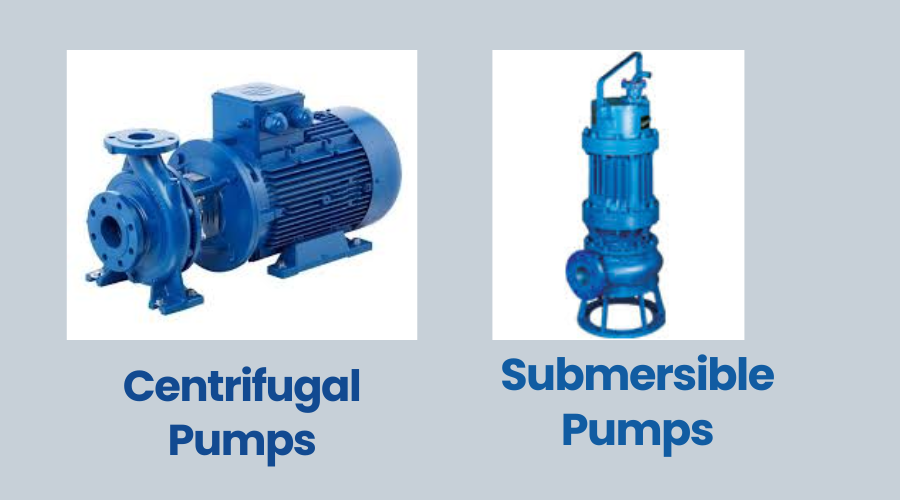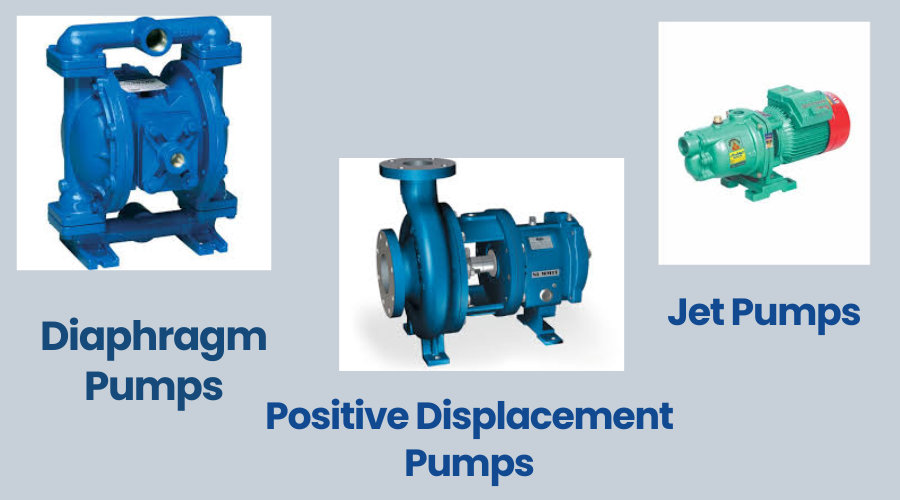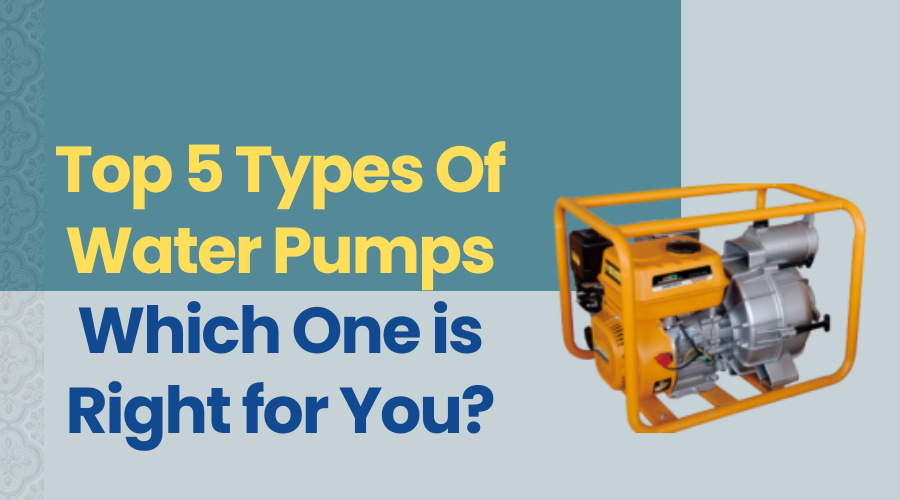Top 5 Types Of Water Pumps: Which One is Right for You?
Water pumps are crucial in various applications, from residential water supply to agricultural irrigation and industrial processes. With many options available, choosing the right type of water pump is crucial to ensuring optimal performance and longevity.
Types Of Water Pumps

Centrifugal Pumps: Versatile and Efficient
- Centrifugal pumps are widely used for pumping water due to their versatility and high efficiency.
- They work by using centrifugal force to move water through a rotating impeller.
- These pumps are the best choice for applications that require high flow rates and moderate pressure, such as residential water supply, irrigation, and HVAC systems.
- They are easy to install and maintain, making them a popular choice for residential and commercial use.
Submersible Pumps: Ideal for Deep Wells and Sumps
- Submersible pumps are significantly used underwater and are ideal for placing deep in wells or sumps.
- These pumps are commonly used for residential well-water systems, groundwater pumping, and drainage applications.
- Due to their high efficiency, submersible pumps are an excellent choice for high-pressure environments.
- Additionally, because they are submerged, submersible pumps operate quietly and are less prone to cavitation.

Diaphragm Pumps: Reliable and Self-Priming
- Diaphragm pumps utilize a flexible diaphragm to create suction and discharge water.
- These pumps are known for their reliability, self-priming capabilities, and ability to handle abrasive or viscous fluids.
- Diaphragm pumps are commonly used in industrial applications, such as chemical processing, wastewater treatment, and oil and gas operations. They are also prevalent in agriculture for spraying pesticides and fertilizers.
- Diaphragm pumps are versatile and can handle many fluids and materials, making them a valuable asset in many industries.
Positive Displacement Pumps: Precise and Consistent
- Positive displacement pumps operate by trapping a fixed amount of fluid and then displacing it through a discharge port.
- They are known for their precision, consistency, and ability to handle high-viscosity fluids.
- Positive displacement pumps are generally used in applications that require accurate dosing or metering, such as pharmaceutical manufacturing, food processing, and chemical injection.
- They are also effective for pumping fluids with variable flow rates or pressures.
Jet Pumps: Efficient and Cost-Effective
- Jet pumps operate using a combination of suction and pressure to draw water from a well or reservoir.
- These pumps are often used in residential water supply systems, particularly in areas with relatively shallow water tables.
- Jet pumps are efficient, cost-effective, and easy to install, making them popular for homeowners with shallow wells or limited space. They are also commonly used for agricultural irrigation and livestock watering.
- Jet pumps come in various configurations, including shallow wells, deep wells, and convertible models, to accommodate different pumping depths and requirements.
Choosing the Right Water Pump for Your Needs:
Now that we've explored the top five types of water pumps, how do you determine which one is right for you? Here are some factors to consider:
Application: Consider the specific application or purpose for which you need the water pump. Different types of pumps are better suited for other tasks, whether supplying water to your home, irrigating crops, or pumping chemicals in an industrial setting.
Flow Rate and Pressure: Determine your application's required flow rate and pressure. Some pumps are better suited for high-flow, low-pressure applications, while others excel at delivering high-pressure, low-flow outputs.
Fluid Compatibility: Consider the type of fluid you'll be pumping and ensure that the pump you choose is compatible with the fluid's properties and composition. Some pumps are designed to handle corrosive, abrasive, or viscous liquids, while others are better suited for clean water applications.
Installation and Maintenance: Evaluate the pump's ease of installation, operation, and maintenance. Choose a pump that aligns with your expertise and available installation and ongoing maintenance resources.
Budget: Consider your budget constraints and choose a pump that offers the best value for your investment. While some pumps may have a higher upfront cost, they provide greater efficiency, reliability, and longevity, resulting in long-term savings.
Conclusion:
Selecting the right water pump is essential for ensuring efficient and reliable water supply in various applications. Many pump options are available to meet your specific needs, whether pumping water for residential use, agricultural irrigation, or industrial processes. You can confidently choose the perfect water pump by considering application requirements, flow rate, pressure, fluid compatibility, installation, maintenance, and budget.



